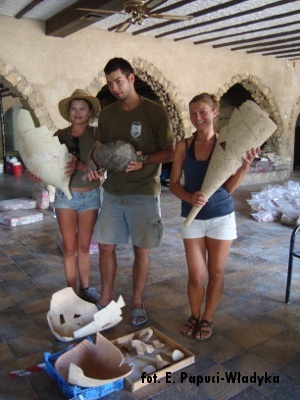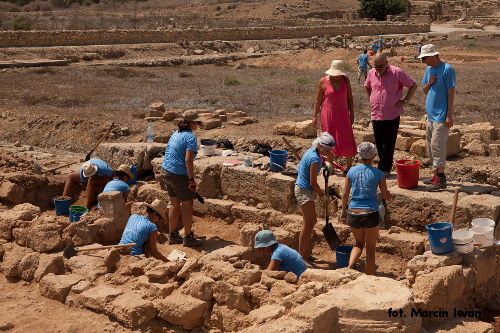Paphos revisited

The Paphos Agora Project, a project of the Institute of Archaeology, was launched in 2011. It has been supported by the National Science Centre grant, funds for statutory activities of the Faculty of History and individual donators.
Last year in the area of Nea Paphos, an ancient city which used to be a capital of Cyprus, a team of archaeologists carried out investigation under the supervision of Prof. Ewdoksia Papucia-Władyka, the Department of Classical Archaeology, Institute of Archeology, Jagiellonian University. The team consisted of JU staff, PhD students, students and volunteers.
The first phase of the project involved the work on the materials discovered during the previous excavations. The finds including numerous vessels, especially amphoras, were identified and recorded. The main focus of the four week excavation was a continuation of works started in 2011 in Trench I located in the central part of Roman agora and Trench II situated by the eastern agora portico. Numerous architectural remains were revealed, including shops (Roman tabernae) adjacent to the streets leading to the agora from the east, water supply devices, floor, and pipes from the Hellenistic and Roman period.
The artefacts found within that area included ceramics, both tableware and cooking utensils as well as ceramics (amphoras, namely for wine and oil). Among the most spectacular finds are: wine leaf shaped golden earring (or pendant), bronze cooking utensils (jug, ladle with iron handle), numerous coins, pins, iron nails, bolts, etc. The materials made of lead include a plaque with Greek inscription mentioning Seleukos, the son of Ioulios Bathylos agoranomos, i.e. high official controlling the city market.
This particular find appears to confirm the presence of agora within that area in the Roman period.
This year the first members of the expedition left Kraków on 12 August. During the first week of their stay in Paphos they organised their workplace and recorded the materials discovered last year. The team continues their investigation within the area of Trench II and newly established Trench III located by the southern agora portico. The university archaeologists hope to discover the evidence confirming that below the Roman agora existed an earlier market dating back to the Hellenistic period.
Polish text: Professor Ewdoksia Papuci-Władyka

Published by: Mariusz Kopiejka
Uniwersytet Jagielloński

